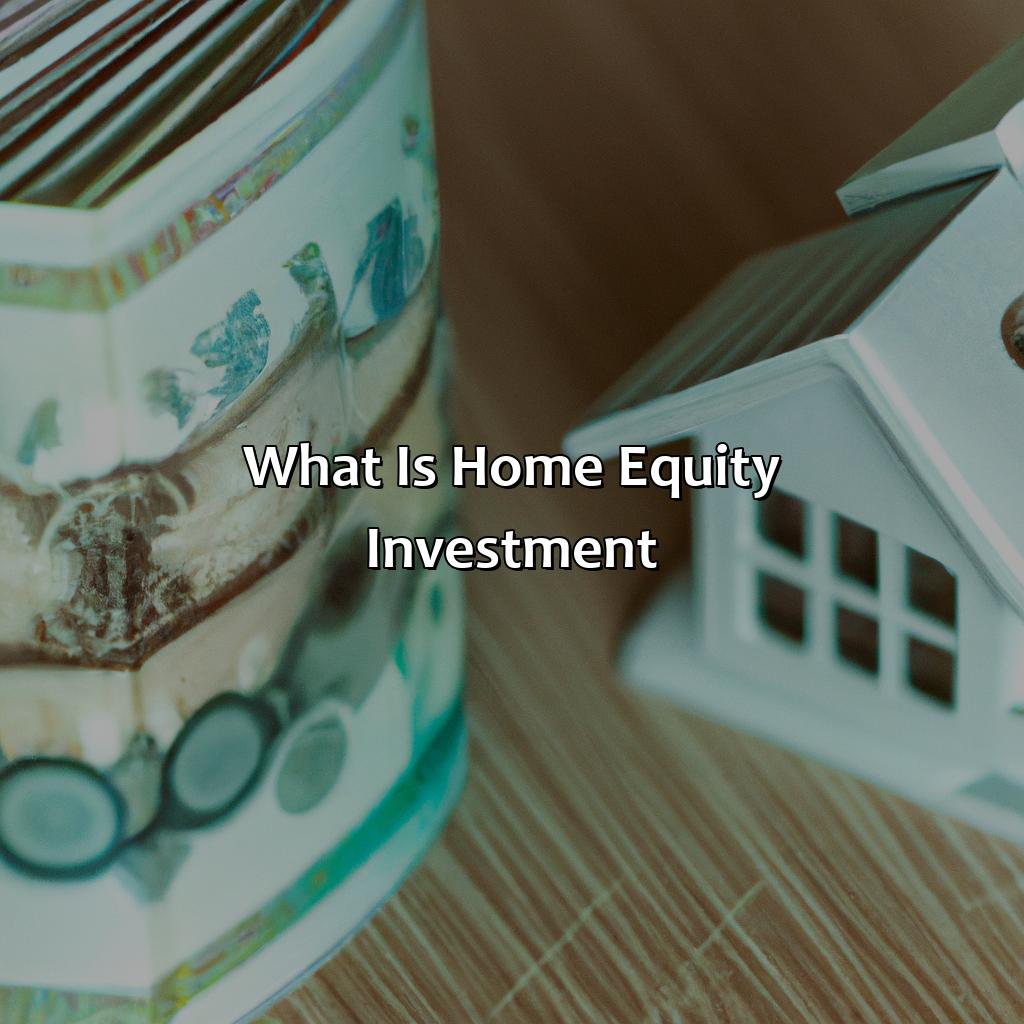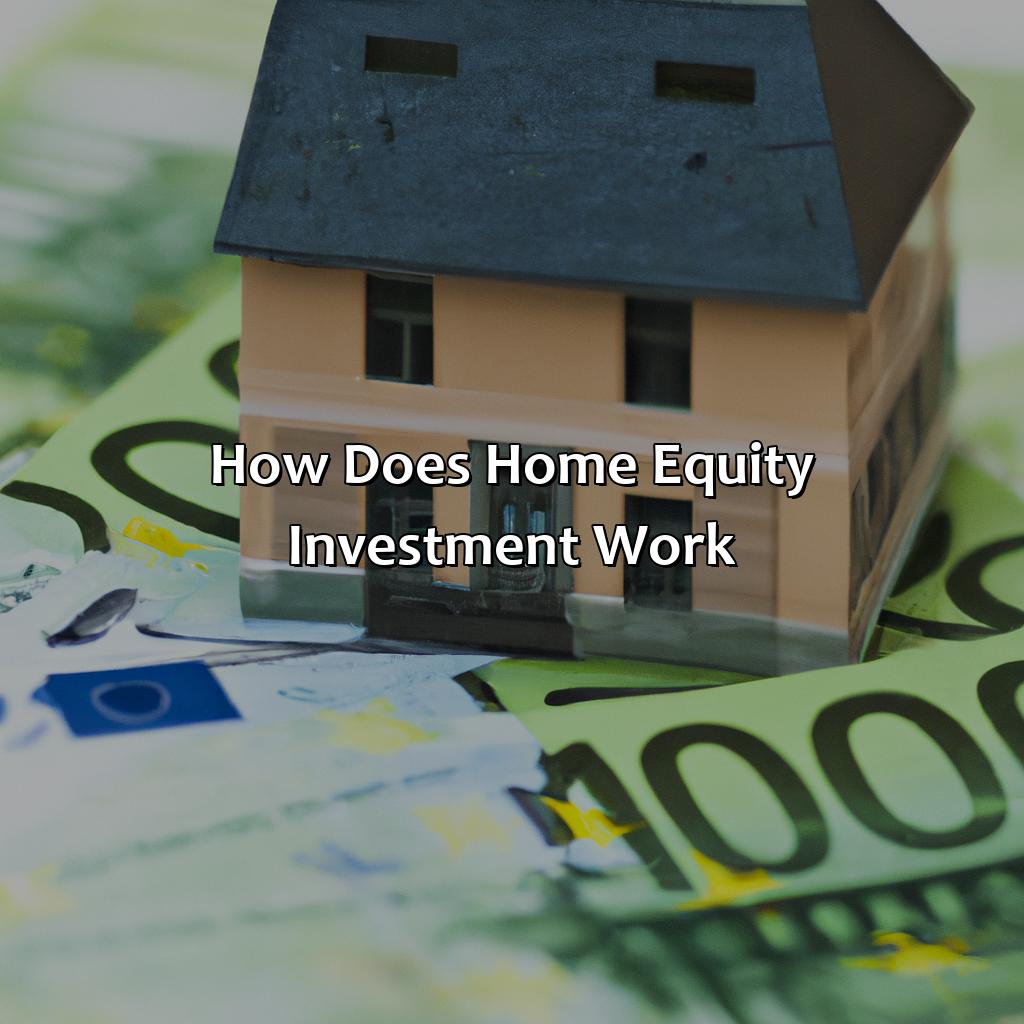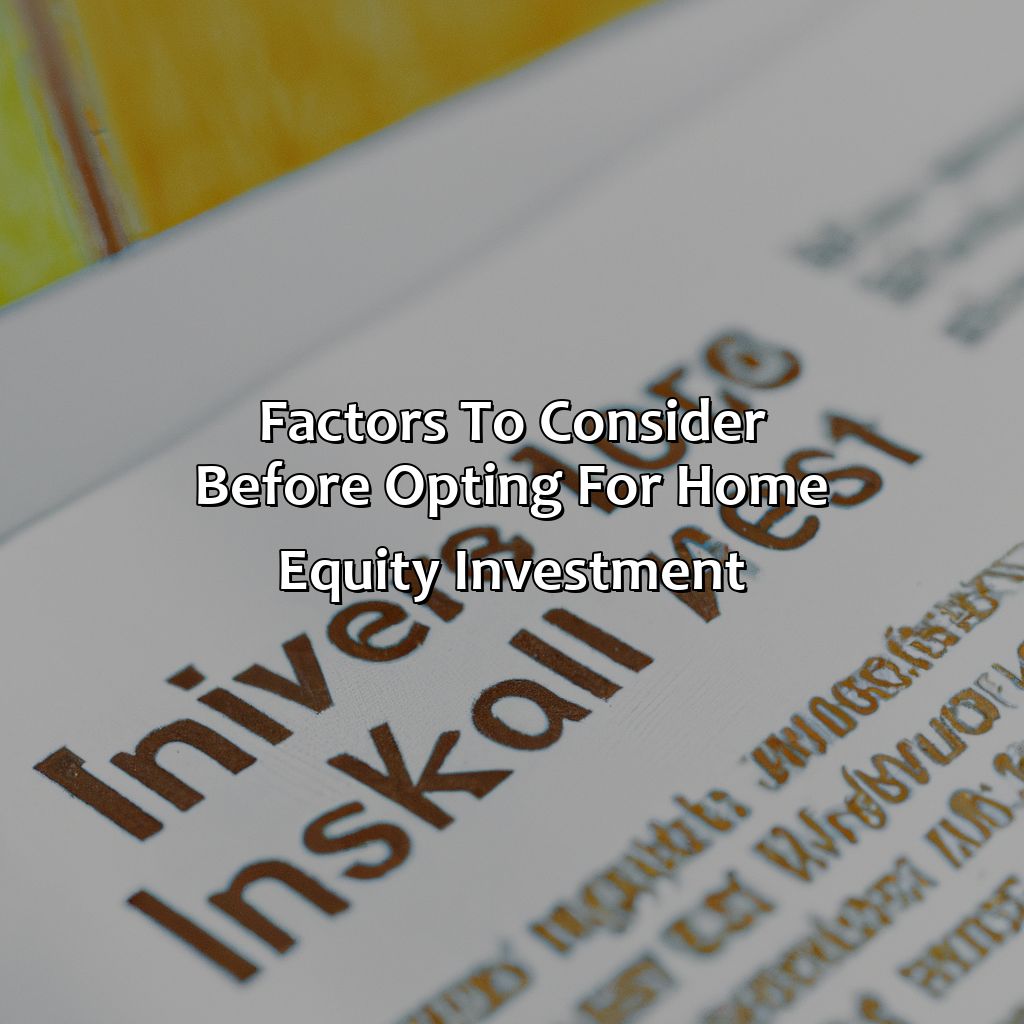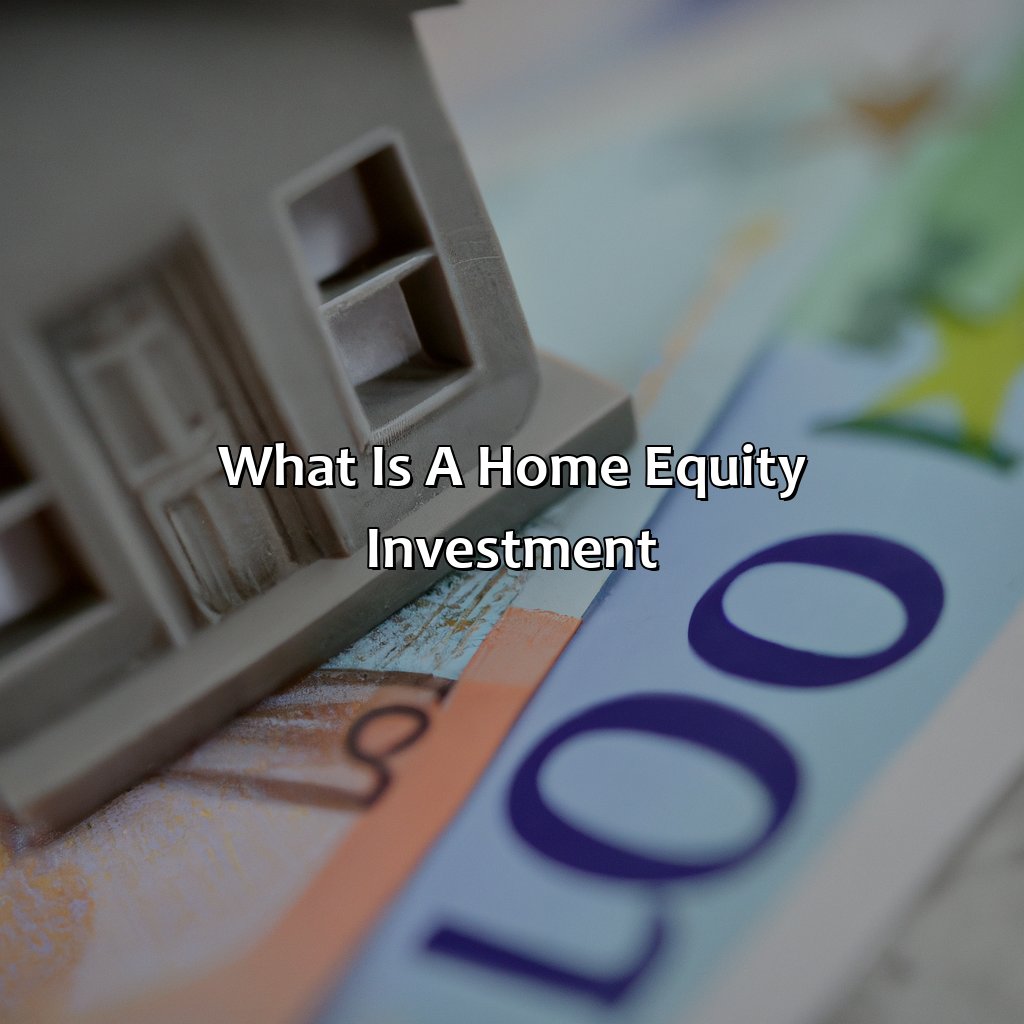What Is A Home Equity Investment?
Key Takeaway:
- Home Equity Investment is a way for homeowners to unlock the value of their home by selling a percentage of the home’s future value to an investor in exchange for a lump sum payment. This can be a good option for homeowners who need access to cash but want to avoid taking on additional debt or selling their home.
- Home Equity Investment is different from a Home Equity Loan in that the homeowner does not have to make monthly payments or pay interest on the investment. Instead, the investor shares in the appreciation of the home’s value over time.
- Before opting for Home Equity Investment, homeowners should carefully consider the risks and benefits, including the potential impact on their future finances and the fact that they are giving up a portion of their home’s future appreciation.
You’re considering investing in a home equity loan, but unsure of what it is? Don’t worry; this article explains the basics and will help you make an informed decision. Discover the potential risks and rewards of home equity investments, and how to turn your home into financial security.
What is Home Equity Investment?
To delve into Home Equity Investment, let’s start with the Definition of it. Also, let’s look into the Difference between Home Equity Investment and Home Equity Loan. Understanding these sub-sections will give you a clear idea. This will help you make wise decisions about your finances.

Image credits: retiregenz.com by Joel Arnold
Definition of Home Equity Investment
Home Equity Investment refers to the process of earning a share in a property’s appreciation value by providing funds to homeowners against their home equity. This investment can be in the form of financing or co-ownership, where investors receive a portion of profits when the house is sold. Home equity investment provides homeowners an opportunity to access funds without selling their property, and investors can earn potentially high returns with lower risk compared to other investments.
Investors and homeowners enter into an agreement, and based on home value appraisal, investors provide funds proportional to the homeowner’s equity share. In return, investors get a percentage of ownership rights and claim for future appreciation gains. This setup allows homeowners to access borrowed funds by not bearing additional debts’ financial burden.
Home equity investments usually have lower interest rates than traditional loans and allow homeowners flexibility in repayment options. As demand for home equity investments has surged over time, many institutional investors have joined this market, providing greater liquidity and more investment opportunities for people who don’t want to invest directly in real estate assets.
Investors seeking low-risk options that provide substantial rewards should consider investing in home equity investments. They also offer stability and predictable returns over time while mitigating potential risks related to vacancy or mortgage defaults. Don’t miss out on the opportunity to enter this exciting market today! Why get a loan when you can invest in your home and become your own bank?
Difference between Home Equity Investment and Home Equity Loan
Home Equity Investment and Home Equity Loan are two different concepts. Here’s a comparison between the two.
| Criteria | Home Equity Investment | Home Equity Loan |
| Type of financing | Equity financing | Debt financing |
| Payouts | No monthly payments, instead payouts based on equity appreciation at the end of investment term or home sale. | Monthly payments plus interest. |
| Risk to borrower | Limited liability as the investor bears the risk. | Borrower carries all risks. |
In addition, home equity investment allows homeowners to receive cash without increasing their debt load, while home equity loans provide a lump sum upfront but increase homeowner’s debt burden.
For homeowners who have sufficient income and good credit score, a home equity loan may be a better choice due to lower interest rates and fixed payment terms. However, for those who want to avoid monthly payments and share financial risk with an investor, home equity investment can be a useful option.
If you opt for home equity investment, make sure you understand all terms of the agreement, including profit-sharing arrangements and potential risks. It’s advisable to work with experienced investors and consult finance professionals before making any decisions regarding your home equity.
Want to turn your home into a goldmine? Home equity investment is the way to go, just don’t forget to invite us to your mansion-warming party.
How Does Home Equity Investment Work?
You must learn the different types of home equity investments and the advantages they give. We’ll explain it all here! This article will give you a crystal clear idea of how it can help you. Types of home equity investment and their benefits for homeowners are the topics we’ll dive into. You’ll know it all by the finish!

Image credits: retiregenz.com by Adam Jones
Types of Home Equity Investment
Home equity investment involves different types of investments that allow homeowners to tap into the equity of their homes. A variety of such investment options are available that offer a flexible way to generate cash without selling a home.
The following table presents some of the popular types of home equity investments:
| Type | Description |
| Home Equity Loan | Fixed interest rate with a lump-sum payout secured by property |
| Home Equity Line Of Credit (HELOC) | A revolving line of credit with adjustable interest rates and a drawdown period |
| Cash-Out Refinance | A new mortgage replaces the current loan, and additional cash is released from the equity. |
Each option has unique features, and one must carefully consider them before deciding which type suits their needs best. Homeowners must also compare interest rates, fees, repayment periods and eligibility criteria for each investment.
A recent report by Housingwire found that there has been an increase in demand for home equity investment post-2020 pandemic.
Home equity investment: because who needs a stable home when you can have a volatile investment portfolio?
Benefits of Home Equity Investment for Homeowners
Equity investments in homes offer many advantages for property owners. Not only can they access additional funding without having to take out loans, but these kinds of investments also help homeowners increase their net worth and diversify their portfolio. Here are some upsides of home equity investment that homeowners may experience:
- Immediate access to cash with zero debt.
- No monthly payments or interests.
- Upfront and transparent terms for the agreement.
- No restrictions on how these funds can be utilized.
- Effortless repayment, as it is linked to the house’s price appreciation
- Risk mitigation from owning a share of the value of one’s house rather than selling it outright.
Moreover, this type of investment provides greater independence and power over financial decision-making for homeowners, increasing their chances of fulfilling near-term goals sooner rather than later. When opting for a home equity investment, it’s essential to look into secondary factors such as market stability or management fees before signing up.
Tom and Lilly needed immediate funds after medical treatments put a severe dent in their savings. However, with minimal credit scores, traditional markets disallowed them from taking out additional loans easily. After considering alternatives like renting extra properties and bill extensions— they eventually came across home equity investments— which allowed them to overcome their tumultuous situation by receiving cash upfront while still being granted full ownership rights to the asset they’ve built over time.
Before jumping into a Home Equity Investment, make sure you didn’t accidentally leave your house keys in the hands of your ex.
Factors to Consider before opting for Home Equity Investment
Before investing in Home Equity, you have to look at some factors. Risks and precautions are two of those factors. In this article, we’ll look into these two sections: Risks Associated with Home Equity Investment and Precautions to take before Investing. We’ll discuss the solutions for these issues.

Image credits: retiregenz.com by David Washington
Risks Associated with Home Equity Investment
Investigating Home Equity Investment Risks can aid in making smart choices when considering investments that entail using property as leverage. Before investing, it is essential to be aware of the varying degrees of risk associated with this type of investment. The loan structure and interest rates are some factors to consider before partaking in a home equity investment.
Home Equity Investments pose unique risks, like reduced equity in one’s house which may lead to diminished options if you need access to additional finances after investing your proceeds. Additionally, there may often be an upfront fee or ongoing subscription charge that surpasses the amount saved on the transaction. Moreover, Return on Investment or ROI should always be factored in while evaluating viability based on profit versus risks.
Gauging the financial status and goals of one’s life are crucial aspects for investors looking to invest in home equity. When examining this opportunity, analyze the prospective investment’s financial stability and degree of growth potential. Understandably, being comfortable with any potential risks starts with educating yourself so you can make wise choices based on distinguished analysis.
One gentleman we knew chose to purchase an apartment complex instead of a mixed-use commercial store utilizing his house’s existing equity as leverage. Unfortunately, his property value plummeted dramatically from market instability leading him into debts he could not repay, ultimately necessitating foreclosure and bankruptcy.
Before investing in home equity, remember: a man’s home may be his castle, but it can also be the site of a financial downfall.
Precautions to take before Investing in Home Equity
When planning on investing in Home Equity, it’s crucial to tread with caution. Here are some vital things to keep in mind to avoid any potential risks or losses:
- First, assess your financial position before making any investment decisions. Analyze your income, expenditure and long-term goals.
- Second, research thoroughly about the lender and understand the terms and conditions of the investment model being offered.
- Consult a professional financial advisor or real estate expert who can guide you with their experience-based insight.
It’s also essential to ensure that all legal formalities are taken care of beforehand, like verifying property registrations and insurance policies. By taking these precautions, you can prevent any possible negative outcomes and make an informed investment decision.
According to CNBC.com, around 4.1 million Americans borrowed against their home equity between 2013 to 2018.
Five Facts About Home Equity Investment:
- ✅ Home equity investment is a type of investment where investors lend money to homeowners in exchange for a share of the home’s appreciation. (Source: Investopedia)
- ✅ Homeowners can use home equity investments as an alternative to traditional home equity loans or lines of credit. (Source: LendingTree)
- ✅ Home equity investments typically have longer terms than traditional home equity loans, ranging from 10-30 years. (Source: Point)
- ✅ Home equity investments can provide homeowners with access to cash without taking on additional debt or monthly payments. (Source: NerdWallet)
- ✅ Home equity investments can benefit investors by providing a potentially high return on investment and diversification in their investment portfolio. (Source: Forbes)
FAQs about What Is A Home Equity Investment?
What is a home equity investment?
A home equity investment is a type of financial investment in which investors provide cash to homeowners in exchange for a share in the future equity of their home. It is a form of alternative financing that allows homeowners to access the equity in their home without taking on additional debt.
How does a home equity investment work?
A home equity investment works by investors providing cash to a homeowner in exchange for a share of the future appreciation or depreciation of their home’s market value. The homeowner continues to own and live in the home, and when the home is sold, the investor receives their share of the home’s equity based on the initial investment.
What are the benefits of a home equity investment?
There are several benefits to a home equity investment, including the ability for homeowners to access the equity in their home without taking on additional debt, the potential for increased investment returns compared to traditional investment options, and the ability to diversify investment portfolios.
What are the risks of a home equity investment?
There are some risks associated with a home equity investment, including the potential for the home’s market value to decrease, the possibility of foreclosure or default, and the possibility of limited liquidity if the homeowner decides not to sell their home.
How is a home equity investment different from a home equity loan?
A home equity investment is different from a home equity loan in that investors provide cash to a homeowner in exchange for a share in the future equity of their home, while a home equity loan is a type of loan that allows homeowners to borrow against the equity in their home. With a home equity loan, the homeowner is taking on additional debt and is required to make monthly payments.
Who is a good candidate for a home equity investment?
A good candidate for a home equity investment is someone who owns a home with significant market value, has a stable income, and is comfortable sharing future equity with investors. Homeowners who are looking to access the equity in their home without taking on additional debt may also benefit from a home equity investment.


